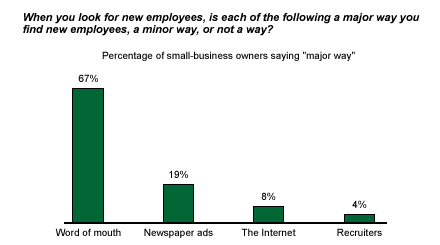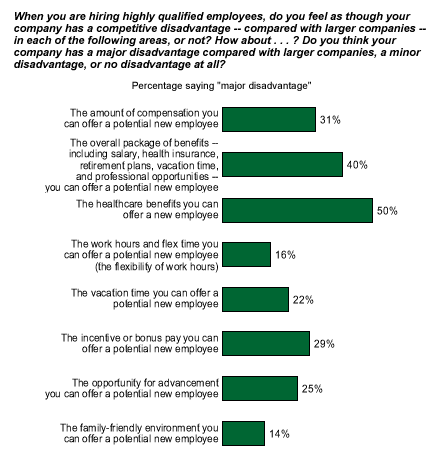Last Friday, the U.S. Department of Labor reported the economy added 274,000 jobs in April, exceeding economists' forecasts and leading to speculation that the economy is coming back from its first-quarter "soft patch." Although a sustained period of substantial job growth is far from certain, it would be good news for the U.S. economy.
However, the Labor report may be bad news for small-business owners, who are struggling to find qualified employees, according to the latest Wells Fargo/Gallup Small Business Index survey*. Right now, about two in three small-business owners say they are having a somewhat or very difficult time finding the right qualified employees for their businesses, and 27% say the difficulty in finding highly qualified employees has hurt their businesses in the past 12 months.
How Do Small-Business Owners Search for New Employees?
One in five small-business owners (20%) say they are currently looking for new employees, and Gallup data suggest most of these owners stick to old-fashioned methods for seeking new hires. Two in three (67%) say that the major way they find new employees is by word of mouth. One in five (19%) say newspaper ads are the major way they find employees, while only 8% use the Internet and only 4% use recruiters.

Hiring Disadvantages
When asked what kind of disadvantages they face in competing with large businesses for qualified employees, half (50%) of all small-business owners say the healthcare benefits they can offer are the major obstacle. Four in 10 small-business owners (40%) point to the overall package of benefits they can afford to offer potential employees. About one in three small-business owners (31%) say compensation is a major disadvantage.
Twenty-nine percent say incentive/bonus pay is a major disadvantage, followed by opportunities for advancement (25%). Twenty-two percent of small-business owners point to vacation time as a major disadvantage, 16% to flex time, and 14% to providing a family-friendly environment.

Older Workers Should Look to Small Businesses -- and Vice-Versa
Overall, the Wells Fargo/Gallup Small Business Index survey suggests many of today's small-business owners find themselves in an "employers' job market" that is not serving them well. If they can't find the highly skilled employees they need at a price they can afford in this job market (in which jobs are still relatively scarce), how are they going to be able to compete if hiring improves?
One possible solution may be for small-business owners to focus on recruiting highly skilled older workers. Half of small-business owners say they would prefer to hire a temporary or contract worker instead of a full-time employee. This might fit the work preference of someone who is retired but wishes to work part time. Retired workers may also be more willing than workers with young families to work with fewer benefits and less pay.
The upshot: If you are retired and would consider working, you should look into a job with a small business. If you are a small-business owner, you may well find a gold mine in older, highly skilled workers. And if you are in government or politics, you should keep in mind that providing incentives for small businesses to hire older employees may be an effective way to reduce the future burden on the Social Security system.
*Gallup surveyed 602 small business owners in six surveys conducted March 9-24, 2005. For results based on this total sample of small business owners, one can say with 95% confidence that the maximum margin of sampling error is ±4 percentage points.
